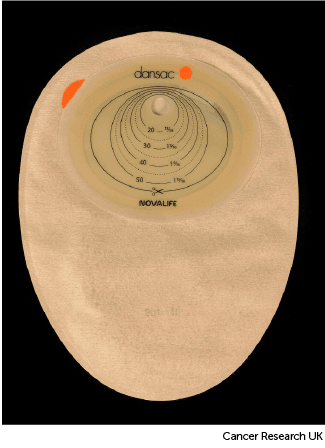Surgery for colon cancer
You might have a temporary colostomy with surgery to remove part of the . This is to give your colon time to rest and heal after surgery. Or you might have temporary colostomy before your surgery for bowel cancer. This is to try to manage or avoid a while having other treatment such as chemotherapy.
Where possible, your surgeon joins the ends of the colon back together in another operation. This is called a stoma reversal. Your surgeon will tell you when you are likely to have this operation.
You might need a permanent colostomy if your surgeon has to remove a large part of your colon and can’t join the remaining ends of colon together. Your surgeon will avoid this if at all possible.
The opening on your abdominal wall (stoma) will be round or oval. It looks red and moist like the inside of your mouth. It doesn't hurt because it has no nerve supply. Because of this you must be careful not to injure your stoma because you won't be able to feel if you have done any damage.
The stoma will be swollen just after your operation but it will get smaller and flatter. You wear a bag stuck onto the skin over the stoma to collect your poo.

These photographs show one type of colostomy bag from the front and back.

Photo showing one type of colostomy bag

Photo showing the back of a colostomy bag
Stoma nurses are experienced in looking after stomas (ileostomies and colostomies) and teaching you how to look after them. A specialist nurse will visit you on the ward to show you what to do.
You usually see the stoma nurse on the lead up to your operation. This means they can talk things through with you and offer advice and support.
The stoma nurse will also see you on the day of the operation. They use a pen to mark where a stoma might be created. For the first few days after your operation the stoma nurse will help you look after and clean the stoma, and change the bags. This is called stoma education. They will also help you to find which type of stoma bag is the best for you.
Your stoma nurse will give you stoma bags to take home. You get more from the chemist, local stockist or delivery service. Supplies are free, but you need a prescription from your GP.
Find out about coping with a colostomy
Learning to look after a stoma takes time and it can be worrying at first. But you won't be expected to cope on your own. You will find that it gets easier with time and you will also have the support from your stoma nurse.
It is helpful to keep everything you need to change your stoma bag together in one place. That way, you won't be half way through and realise that something vital is missing.
Talk to your stoma nurse or ward nurses about the kind of support you will need at home. Before you leave hospital you might want the stoma nurse to show your relatives how to look after the colostomy. They can help when you get home.
Your stoma nurse will give you a contact number before you leave the hospital. You can ring them for advice and support, and the nurse may arrange to visit you at home.
Last reviewed: 02 Jan 2025
Next review due: 02 Jan 2028
Bowel cancer is also called colorectal cancer. It affects the large bowel, which is made up of the colon and rectum.
You might have a colostomy or ileostomy after surgery for bowel cancer. The end of your bowel is brought out into an opening on your tummy. The opening is called a stoma or ostomy.
The type of surgery you have for cancer of the large bowel (colon) depends on the position and the size of the cancer in the bowel.
Treatment depends on whether you have colon or rectal cancer, as well as your cancer stage. You might have surgery, radiotherapy or chemotherapy or a combination of these.
Bowel cancer means cancer that starts in the colon (large bowel) or back passage (rectum). It is also known as colorectal cancer.

About Cancer generously supported by Dangoor Education since 2010. Learn more about Dangoor Education
Search our clinical trials database for all cancer trials and studies recruiting in the UK.
Connect with other people affected by cancer and share your experiences.
Questions about cancer? Call freephone 0808 800 40 40 from 9 to 5 - Monday to Friday. Alternatively, you can email us.